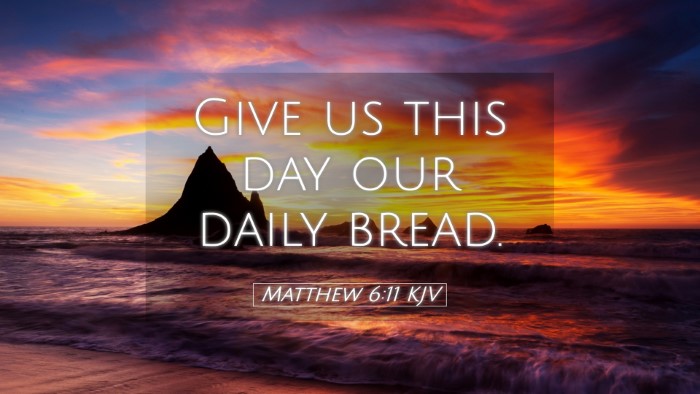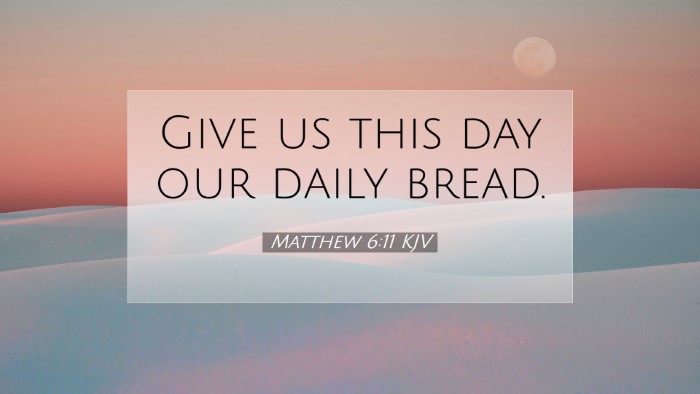Commentary on Matthew 6:11
Bible Verse: "Give us this day our daily bread." (Matthew 6:11)
Introduction
This verse is part of the Lord's Prayer, delivered by Jesus to His disciples as a model for prayer. The phrase "Give us this day our daily bread" encapsulates not only a request for physical sustenance but also reflects broader theological themes related to dependence on God and the communal nature of prayer.
Exegesis of the Text
-
Contextual Framing:
Within the context of the Sermon on the Mount (Matthew 5-7), this petition illustrates the nature of God's kingdom and the relationship humans ought to have with their Creator. It emphasizes trusting in divine provision amidst life's uncertainties.
-
Temporal Focus:
The phrase "this day" indicates a daily reliance on God, contrasting with materialism and the anxiety of accumulating resources for future needs.
-
Theological Implications:
This request for "daily bread" signifies not only the sustenance required for physical life but also spiritual nourishment, akin to the manna that God provided to the Israelites in the wilderness (Exodus 16:4).
Insights from Public Domain Commentaries
-
Matthew Henry:
Henry emphasizes the simplicity and humility of the request. He notes that “daily bread” is a reminder that we should not be concerned with luxuries but rather with the basic necessities of life. This plea encourages believers to trust in God’s provision for each day.
-
Albert Barnes:
Barnes elaborates on the importance of the word "give," highlighting that it acknowledges God as the ultimate provider. He points out the significance of the word "our," which indicates a communal aspect of the prayer—believers are called to consider the needs of others alongside their own, fostering a spirit of fellowship and unity.
-
Adam Clarke:
Clarke interprets "daily bread" as indicative of not just physical food but all necessities for life. He notes that the phrase underscores the idea that believers must rely daily on God's grace and provision, suggesting that spiritual bread—the Word of God—is just as essential.
Practical Applications
-
Dependence on God:
This verse encourages believers to foster a daily dependence on God for all their needs. In a world often characterized by self-sufficiency and independence, the call to seek daily provision reminds us of our reliance on God's grace and mercy.
-
Prayer and Provision:
The model prayer teaches the importance of bringing our needs before God, framing our requests in a posture of humility and dependence. It serves as an invitation to engage in ongoing communication with the Divine.
-
Community and Care:
The communal aspect implied in "our" challenges individuals and congregations to consider their role in meeting the needs of others. Believers are called not only to pray for their sustenance but also to work towards ensuring that all members of the community have what they need.
The Broader Biblical Narrative
Throughout Scripture, the theme of divine provision is prominent. In the Old Testament, God’s provision of manna in Exodus signifies sustenance from God. Similarly, in the New Testament, Jesus multiples bread and fish (John 6), underscoring His role as the provider. This continuity illustrates God's enduring promise to care for His people.
Conclusion
Matthew 6:11 is a profound and multifaceted petition that encapsulates the essence of spiritual dependence and the priority of communal needs. Its inclusion in the Lord's Prayer reflects the model of humility, trust, and service that Jesus embodies. For pastors, students, theologians, and scholars, this verse serves as a foundation for understanding not just the content of prayer, but the heart behind it—a commitment to seeking God in all aspects of life.


